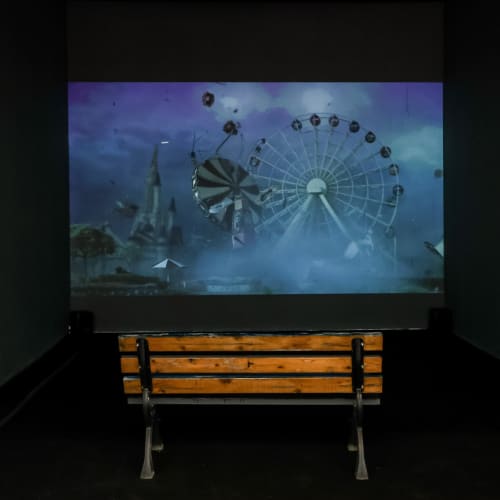Venue| Nanjing International Exhibition Centre, Hall A&B
Booth|NAFI-FOCUS A-03
Participating Artists|Yuan Goang-Ming, Wu Chi-Yu
Opening Hours|
▋VIP Preview ▋
▋Public Viewing ▋
In the world of tomorrow, as art confronts profound technological shifts, it seeks to articulate the exploration and contemplation of the contemporary landscape, while reflecting on nature and history. At the same time, there is a profound reverence for and a deep engagement with the cultural environment, ultimately foregrounding the intrinsic value of humanity. For the 2023 edition of Nanjing Art Fair International (NAFI), TKG+ is pleased to present Yuan Goang-Ming and Wu Chi-Yu in “The World of Tomorrow”, a project that imagines tomorrow through the disruption of the everyday, exploration of historical origins, and consumption of the moving image.
With video as his primary medium, Yuan Goang-Ming (b. 1965) infuses his work with visual poetics that not merely reflects the collective consciousness and subconsciousness of humanity, but also speak universal truths that transcend geographical boundaries. Tomorrowland (2018) by Yuan Goang-Ming confronts the viewer with a sudden explosion of an amusement park as a symbol of utopia, unfolding in slow motion. Invoking the normalization of warfare in our time, the work explores the existential concept of time and space in modern life from a critical perspective.
Wu Chi-Yu (b. 1986) has focused in recent years on the methodology of his practice, contemplating the idea of video essay. The depiction of the contemporary world, for Wu, lies within the realm of storytelling and written form, with humanity as the interpreter in a world full of signals yet to be deciphered. The interpretation of the world is not confined to specific species or moments in time; the world, in this context, refers to a past that coexists in the present and the future. Through various metaphors involving human and non-human, digital signals and natural ecosystems, planets and the universe, Wu hints to the viewer that “on a greater scale humanity can comprehend and ponder the world they inhabit,” and that the connection and exchange between species never cease in works such as Hominins (2019), Reading List (2017), and A Private Collection (2016).
Looking back, humanity once believed gods ruled the world, that natural disasters were the punishment for human sins, until scientists discovered the regularity in weather patterns. Humanity once thought the Earth was flat, that the edge of the world marked the endpoint, until Christopher Columbus discovered the Americas. Humanity once believed that diseases were a curse, that the only way to survive was through exorcism, until doctors found antibiotics. Since antiquity, history has been a constant accumulation of events and discoveries. In today’s era of rapid technological change, biotechnology has replaced natural evolution, and artificial intelligence challenges the human mind. Moving forward, how should humanity navigate its path?



